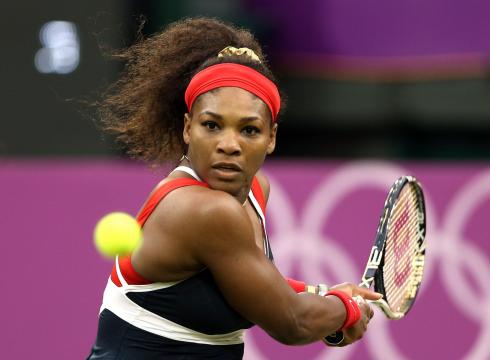Serena powers her way to Wimbledon final
Venus Williams’ deepest Grand Slam run in a half-dozen years ended one victory short of what would have been yet another Wimbledon title match against her sister Serena.
Unable to replicate the sort of turn-back-time performance that carried her to the semifinals at the All England Club, Venus was broken in her first four service games Thursday and lost to No. 4-seeded Angelique Kerber 6-4, 6-4.
The 36-year-old Venus was the oldest Slam semifinalist since Martina Navratilova was 37 at Wimbledon in 1994. Venus is a five-time champion at the grass-court tournament, but she hadn’t made it this far since at Wimbledon since 2009, or at any major since the 2010 U.S. Open.
So now, instead of an all-Williams final on Saturday, it will be Kerber against No. 1 Serena in a rematch of the Australian Open final won by the German in January.
That was Kerber’s first Grand Slam title, and prevented Serena from collecting her record-equaling 22nd. Now Serena is once again so close to that number.
In control from start to finish in Thursday’s first semifinal, Serena needed all of 48 minutes to overwhelm Elena Vesnina 6-2, 6-0 in what felt like a training session.
Except Serena probably gets more of a workout when she practices.
“You have to admit she was just better. She was stronger, faster,” Vesnina said. “I couldn’t do anything today.”
Serena’s serve was in fine form, reaching 123 mph and producing 11 aces against the 50th-ranked Vesnina, who was making her major semifinal debut.
Serena won 28 of 31 points that she served, including the last 17, and compiled a 28-9 edge in total winners.
Since winning her sixth Wimbledon trophy a year ago to raise her career count to 21 majors, Serena has come quite close to tying Steffi Graf with 22, the most in the Open era, which began in 1968 (Margaret Court holds the all-time mark of 24). But Serena was surprisingly beaten by Roberta Vinci in the U.S. Open semifinals last September, then by Kerber in Melbourne, and by Garbine Muguruza in the French Open final last month.
“I mean, I think for anyone else in this whole planet, it would be a wonderful accomplishment,” Serena said about reaching her third Grand Slam final of the year. “For me, it’s about, obviously, holding the trophy and winning, which would make it a better accomplishment for me. For me, it’s not enough. But I think that’s what makes me different. That’s what makes me Serena.”
And now she has given herself yet another chance to catch Graf.
Except rather than a fifth Williams vs. Williams final at Wimbledon, and ninth at a major, it will be Serena vs. Kerber.
Serena has won five of their previous seven matches.
The left-handed Kerber dropped to her knees at the baseline and tossed aside her racket after a running cross-court forehand winner capped the 19-stroke exchange that ended her semifinal against Venus.
Venus once rivaled her sister for the most feared serve in women’s tennis, but it took her 32 minutes and five tries to simply earn a hold. Perhaps the accumulated court time during this fortnight simply took a toll on Venus, who revealed in 2011 that she had been diagnosed with Sjongren’s syndrome, which can cause fatigue and joint pain.
She was a half-step slow to some balls, was breathing heavily after longer points, and wound up with 21 unforced errors, 10 more than Kerber. Still, Kerber was hardly at her best at the outset, either: The match began in ragged fashion, with five consecutive breaks of serve. The question at that point was which woman would break the pattern.
Turned out to be Kerber, who held for a for a 4-2 lead then, after getting broken the first time she served for the opening set, held again to take it when Venus netted a forehand.
Earlier on Centre Court, Serena never gave Vesnina a chance to pull off the sort of semifinal stunner that Vinci did last year in New York, stopping Williams from completing the first calendar-year Grand Slam since Graf did it in 1988.
Jumping out to a big lead right away and never relenting, the 34-year-old Williams had Vesnina looking defeated after all of 12 points. That’s when, after sprinting for a forehand that landed in the net, the Russian leaned over, sighed and slumped her shoulders.
There would be plenty more of that sort of body language from Vesnina, a two-time Wimbledon runner-up in doubles who was to face Serena and Venus in the quarterfinals of that event later in the day.
Article written by Howard Fendrich. Follow Howard Fendrich on Twitter at http://twitter.com/HowardFendrich
0

